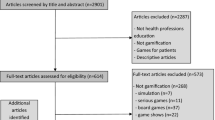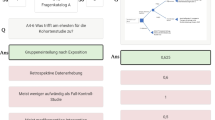Abstract
A longstanding challenge facing MD-PhD students and other dual-degree medical trainees is the loss of clinical knowledge that occurs during the non-medical phases of training. Academic medical institutions nationwide have developed continued clinical training and exposure to maintain clinical competence; however, quantitative assessment of their usefulness remains largely unexplored. The current study therefore sought to both implement and optimize an online game platform to support MD-PhD students throughout their research training. Sixty-three current MD-PhD students completing the PhD research phase of training were enrolled in an institutionally developed online game platform for 2 preliminary and 4 competition rounds of 3–4 weeks each. During preliminary game rounds, we found that participation, though initially high, declined precipitously throughout the duration of each round, with 37 students participating to some extent. Daily reminders were implemented in subsequent rounds, which markedly improved player participation. Average participation in competition rounds exceeded 35% (23/63) active participants each round, with trending improvement in scores throughout the duration of PhD training. Both player participation and progress through the research phase of the MD-PhD program correlated positively with game performance and therefore knowledge retention and/or acquisition. Coupled with positive survey-based feedback from participants, our data therefore suggest that gamification is an effective tool for MD-PhD programs to combat loss of clinical knowledge during research training.




Similar content being viewed by others
Abbreviations
- ANCOVA:
-
Analysis of Covariance
- ANOVA:
-
Analysis of Variance
- CCE:
-
Continuing Clinical Education
- MSTP:
-
Medical Scientist Training Program
- UAB:
-
University of Alabama at Birmingham
- USMLE:
-
United States Medical Licensing Examination
References
Alamri Y. The combined medical/PhD degree: a global survey of physician-scientist training programmes. Clin Med (Lond) 2016;16(3):215–18.
Amaral F, Almeida Troncon EL. Retention of knowledge and clinical skills by medical students: a prospective, longitudinal, one-year study using basic pediatric cardiology as a model. Open Med Educ J 2013;6:48–54.
Bills JL, Davidson M, Dermody TS. Effectiveness of a clinical intervention for MD/PhD students re-entering medical school. Teach Learn Med 2013;25(1):77–83.
Chrzanowski S. Transitions within MD-PhD programs: reassurance for students. Med Sci Educ 2017;27:835–7.
Custers EJ. Long-term retention of basic science knowledge: a review study. Adv Health Sci Educ Theory Pract 2010;15(1):109–28.
D’Angelo AD, D’Angelo JD, Rogers DA, Pugh CM. 2017. Faculty perceptions of resident skills decay during dedicated research fellowships. Am J Surg.
Dugdale A, Alexander H. Knowledge growth in medical education. Acad Med 2001;76(7):669–70.
Goldberg C, Insel PA. Preparing MD-PhD students for clinical rotations: navigating the interface between PhD and MD training. Acad Med 2013;88(6):745–7.
Greb AE, Brennan S, McParlane L, Page R, Bridge PD. Retention of medical genetics knowledge and skills by medical students. Genet Med 2009;11(5):365–70.
Harding CV, Akabas MH, Andersen OS. History and outcomes of 50 years of Physician-Scientist Training in Medical Scientist Training Programs. Acad Med 2017;92(10):1390–8.
Kerfoot BP, DeWolf WC, Masser BA, Church PA, Federman DD. Spaced education improves the retention of clinical knowledge by medical students: a randomised controlled trial. Med Educ 2007;41(1):23–31.
Kerfoot BP, Fu Y, Baker H, Connelly D, Ritchey ML, Genega EM. Online spaced education generates transfer and improves long-term retention of diagnostic skills: a randomized controlled trial. J Am Coll Surg 2010;211(3):331–337 e331.
Matos J, Petri CR, Mukamal KJ, Vanka A. Spaced education in medical residents: an electronic intervention to improve competency and retention of medical knowledge. PLoS One 2017;12(7):e0181418.
McCoy L, Lewis JH, Dalton D. Gamification and multimedia for medical education: a landscape review. J Am Osteopath Assoc 2016;116(1):22–34.
Nevin CR, Westfall AO, Rodriguez JM, Dempsey DM, Cherrington A, Roy B, Patel M, Willig JH. Gamification as a tool for enhancing graduate medical education. Postgrad Med J 2014;90(1070):685–93.
Roche CC, Wingo NP, Willig JH. Kaizen: An innovative team learning experience for first-semester nursing students. J Nurs Educ 2017;56(2):124.
Schmidmaier R, Ebersbach R, Schiller M, Hege I, Holzer M, Fischer MR. Using electronic flashcards to promote learning in medical students: retesting versus restudying. Med Educ 2011;45(11):1101–10.
Swartz TH, Lin JJ. A clinical refresher course for medical scientist trainees. Med Teach 2014;36(6):475–9.
Williams CS, Iness AN, Baron RM, Ajijola OA, Hu PJ, Vyas JM, Baiocchi R, Adami AJ, Lever JM, Klein PS, Demer L, Madaio M, Geraci M, Brass LF, Blanchard M, Salata R, Zaidi M. Training the physician-scientist: views from program directors and aspiring young investigators. JCI Insight 2018;3(23):e125651.
Funding
This project was supported by a Teaching Innovation & Development Grant from the UAB Center for Teaching and Learning and the UAB Medical Scientist Training Program T32GM008361.
Author information
Authors and Affiliations
Corresponding author
Ethics declarations
Conflict of Interest
The authors declare that they have no competing interests.
Ethical Approval
All procedures performed in studies involving human participants were in accordance with the ethical standards of the University of Alabama at Birmingham and with the 1964 Helsinki declaration and its later amendments or comparable ethical standards.
Informed Consent
Informed consent was obtained from all individual participants included in the study.
Additional information
Publisher’s Note
Springer Nature remains neutral with regard to jurisdictional claims in published maps and institutional affiliations.
Mark E. Pepin and William M. Webb contributed equally.
Electronic supplementary material
Rights and permissions
About this article
Cite this article
Pepin, M.E., Webb, W.M., Boppana, S. et al. Gamification: an Innovative Approach to Reinforce Clinical Knowledge for MD-PhD Students During Their PhD Research Years. Med.Sci.Educ. 29, 739–747 (2019). https://doi.org/10.1007/s40670-019-00725-1
Published:
Issue Date:
DOI: https://doi.org/10.1007/s40670-019-00725-1




